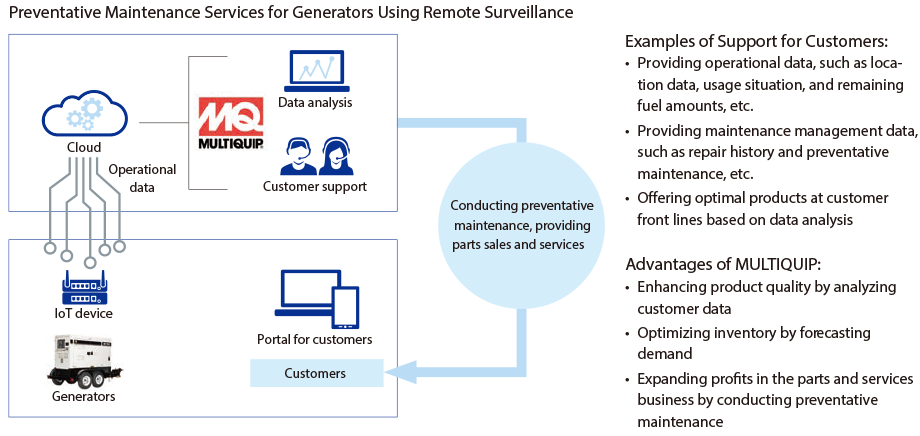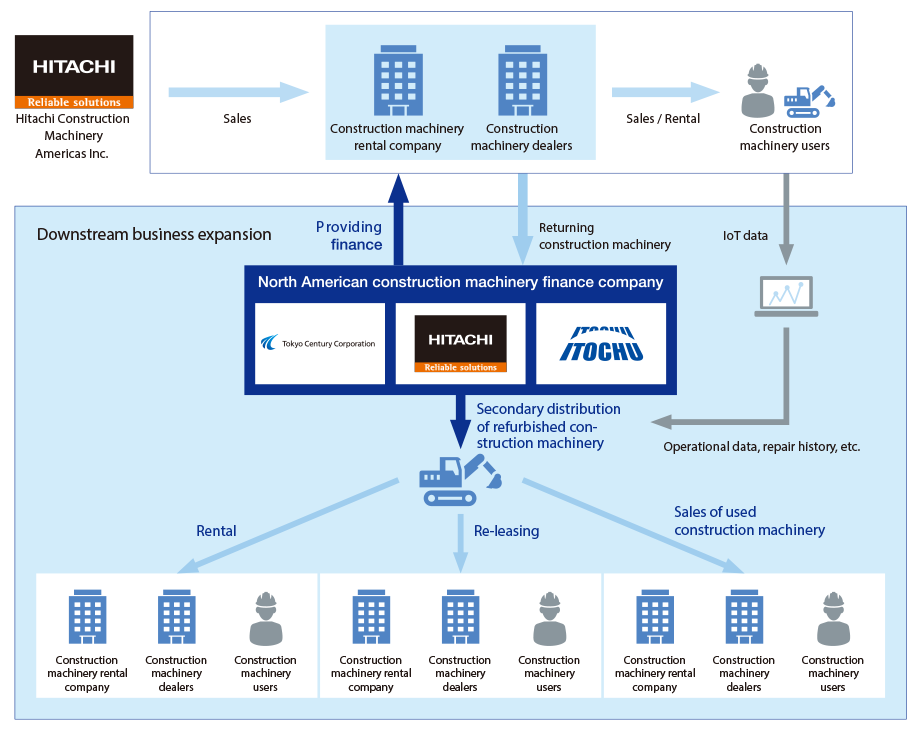TRANSFORMATION4:New Steppingstones for the Advancement of the Construction Machinery Business

ITOCHU has been active in the construction machinery business since long ago, but is currently transforming its business model in line with changes in the external environment. The Company has set out basic policies for its growth strategy of expanding the value chain into downstream areas and helping customers solve the issues they face on the front lines. We are working to uncover diverse customer needs and expand our earnings base in the construction machinery business by fully leveraging the “comprehensive strength” of the Company. This includes our existing customer base and financing know-how, especially in North America, where demand for construction machinery is strong and steady.
Construction Machinery Life Cycle Strategy
Construction machinery is generally used over a long-term period between 10 and 15 years. Besides simply selling construction machinery, there are also business opportunities in selling parts, providing repair and other services, financing, renting construction machinery, and selling used construction machinery. ITOCHU’s construction machinery business began by exporting the products of domestic Japanese construction machinery manufacturers to overseas countries. Later, in line with changes to the kind of functions manufacturers needed, we began engaging in business investment in overseas construction machinery dealers to support the overseas expansion of manufacturers. In this way, we have developed our business through both trade and business investment. Recently, however, manufacturers have started preferring direct transactions with local construction machinery dealers, which bypasses ITOCHU. That business is on a downward trajectory due in part to shrinking trade and the reversion of the dealers’ commercial rights. On the other hand, with the rapid push toward digitalization in the construction machinery industry, manufacturers urgently need to transform their businesses in line with diversifying customer needs, such as enhancing uptime ratio through preventative maintenance, enabling the online purchase of construction machinery and parts, selling used construction machinery, and offering rentals.
In light of this situation, the Company has worked to transform its business model since FYE 2020. We crafted our Construction Machinery Life Cycle Strategy with the aim of expanding the value chain of the construction machinery business into other downstream areas besides sales. In line with this strategy, ITOCHU invested in a construction machinery rental company through its domestic subsidiary ITOCHU TC CONSTRUCTION MACHINERY CO., LTD. and also invested in an online construction machinery rental marketplace operator in the United States, thereby steadily expanding its downstream businesses. In addition, MULTIQUIP INC. (MULTIQUIP), which operates the manufacture and sale businesses for light construction equipment and power generators in North America, has equipped its power generators with IoT devices that collect operational data. With this data, the Company strives to more stably expand its earnings base by extending the machinery uptime ratio, which is the most important customer need, and enabling timely parts sales and provision of services.

Investing in Hitachi Construction Machinery Co., Ltd.
We plan to invest in Hitachi Construction Machinery Co., Ltd. (Hitachi Construction Machinery) in the second quarter of FYE 2023. This company had previously partnered with U.S.-based Deere & Company on its construction machinery business. After ending its alliance with Deere & Company, it urgently needed to select new business partners to work with on vertically establishing a sales and service network encompassing sales, financing, repairs, and more. ITOCHU had a track record of many years supporting sales of Hitachi Construction Machinery products all over the world. In particular, we have worked with them as a business partner for their finance and construction machinery sales businesses in Indonesia. In addition, ITOCHU is already engaged in the construction machinery business in North America, and the Company has the Group’s land and marine logistics networks between Japan and the United States, as well as the finance business know-how of Tokyo Century Corporation. Moreover, synergies with MULTIQUIP’s customer base are expected from its construction machinery rental company. For these and other reasons, we are realizing this capital alliance with Hitachi Construction Machinery. As a first step in this collaboration, ITOCHU is considering establishing a North American construction machinery finance company with Hitachi Construction Machinery and Tokyo Century Corporation. This finance company will work to expand its market share by providing financial functions to Hitachi Construction Machinery’s construction machinery dealers and end users in North America. The company will also promote downstream businesses, such as a rental business for used construction machinery and a sales business for premium used construction machinery with visualized operational and repair history. Moreover, the company will promote a maintenance and re-lease business for returned machinery, by assessing operational data and repair history through IoT data.
Going forward, we will expand the construction machinery business by jointly procuring and managing core components used in MULTIQUIP’s generators and Hitachi Construction Machinery’s hydraulic excavators and by utilizing joint transportation and warehouse operations in North America. Based on a market-oriented perspective, we will continue expanding the earnings base of our North American business while pursuing synergies, such as promoting cross-sell to customers of the North American construction materials business that use generators and mini excavators on construction sites. In addition, in the near future, we will roll out best practices gained from the collaboration with Hitachi Construction Machinery in North America to other regions around the world and accelerate our business expansion.

Evolution of Value Chains, Starting with FamilyMart TRANSFORMATION2:Self-Transformation in Anticipation of Changes in the Market of the ICT & Financial Business Company
